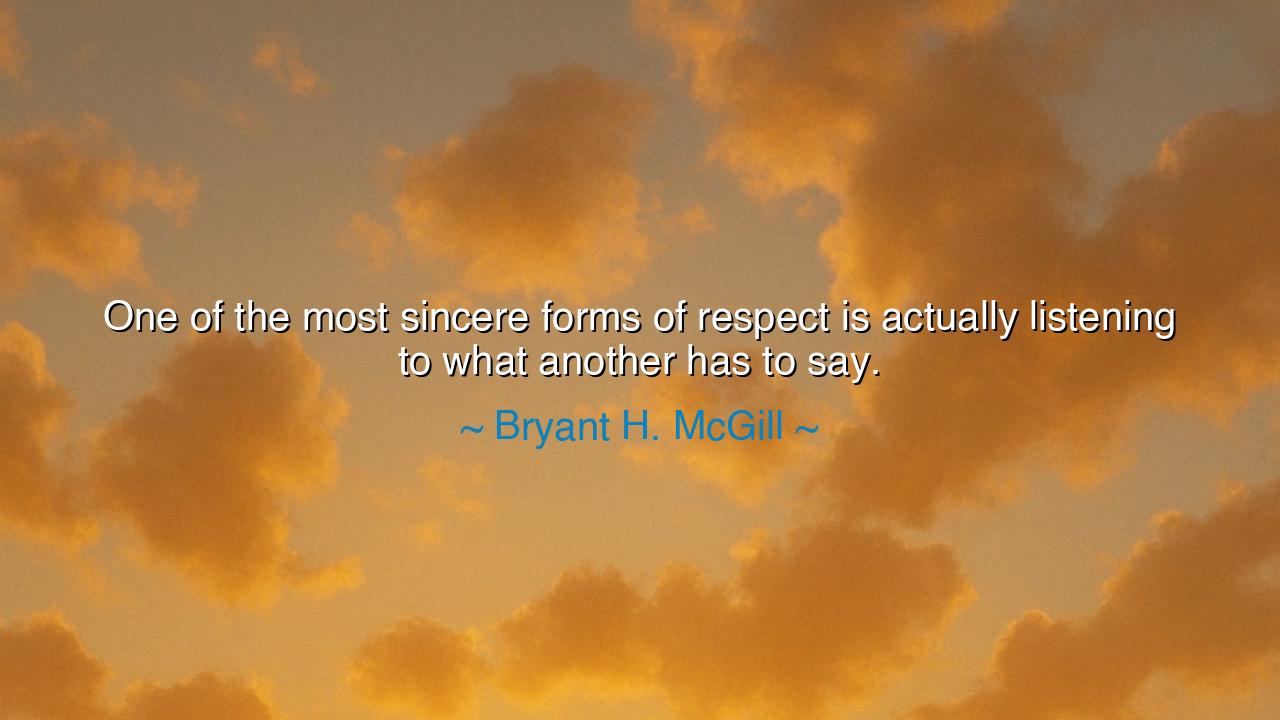
One of the most sincere forms of respect is actually listening to
One of the most sincere forms of respect is actually listening to what another has to say.






The words of Bryant H. McGill, “One of the most sincere forms of respect is actually listening to what another has to say,” resound with quiet power, carrying within them the essence of true human connection. For to listen is not a passive act, but a sacred offering: the gift of presence, the surrender of pride, the acknowledgment that the voice of another has worth. Many speak, few listen. Many hear the sounds of words, but few open their hearts to their meaning. To truly listen is to affirm the dignity of another’s soul.
To understand this, we must see that respect is not found in titles, gestures, or empty courtesies alone. Respect is lived in the moment when one human turns their full attention to another, setting aside judgment, haste, and self-absorption. In such silence, a bond is formed. The speaker feels seen, the listener becomes wiser, and both are elevated. McGill reminds us that among all forms of honor, this is the most sincere: not flattery, not gifts, not applause, but the quiet, attentive listening to the truth of another’s voice.
The ancients spoke of this with reverence. In the dialogues of Plato, Socrates is remembered not for speeches alone, but for his endless questions, his willingness to hear, to probe, to draw out the wisdom of others. The Confucian sages taught that to listen with care is to cultivate ren—the highest virtue of humanity. Even the prophets of old were listeners before they were speakers, receiving words in silence before declaring them to the world. Thus, listening is not weakness but greatness, the foundation of wisdom and justice.
History gives us luminous examples. Consider Abraham Lincoln, who in the midst of the Civil War held open hours where ordinary citizens could come and speak. Though burdened with the fate of a nation, he bent his ear to the poor, the widow, the soldier, and the farmer. His ability to listen deeply shaped his decisions and won him the respect of both allies and enemies. In contrast, rulers who refuse to listen grow deaf to the cries of their people, and in that deafness, they lose not only respect but their very thrones.
The heart of McGill’s teaching is this: to listen is to humble oneself. It is to say, “Your words matter. Your experience is worthy. Your voice deserves space.” In a world where noise is constant and pride is loud, such listening becomes a heroic act. It requires patience, restraint, and compassion. But when practiced, it transforms relationships, heals wounds, and builds bridges where once there were walls.
The lesson for us is clear: if you wish to give respect, begin by listening. Do not interrupt with your own stories; do not dismiss with quick judgment; do not listen only to reply, but listen to understand. Let your silence be filled with presence, and let your presence affirm the value of the one before you. In doing so, you honor not only their words but their very being.
Practical actions follow. Each day, choose one conversation where you will listen fully—without distraction, without glancing at devices, without rehearsing your reply. Ask questions that invite depth, and resist the urge to dominate the dialogue. Practice listening even to those you disagree with, for respect is most needed where conflict divides. And when you have listened well, reflect upon what you heard, so that the speaker knows their voice was not lost in the air.
Thus McGill’s words endure as a lamp for our time: “One of the most sincere forms of respect is actually listening to what another has to say.” Carry them as a command and a blessing, that your life may be marked not only by eloquence in speech, but by greatness in listening. For the one who truly listens does not merely honor another’s voice—they honor the very humanity that binds us all.






AAdministratorAdministrator
Welcome, honored guests. Please leave a comment, we will respond soon